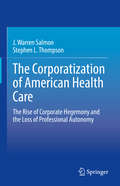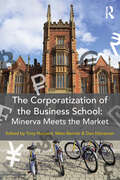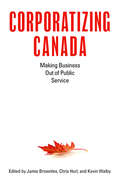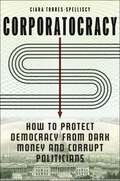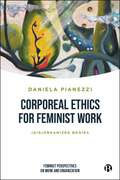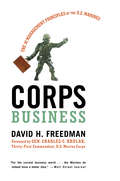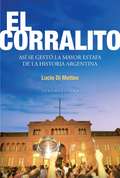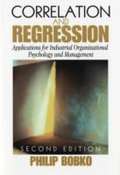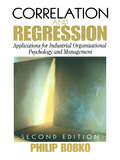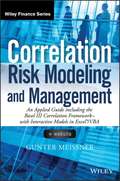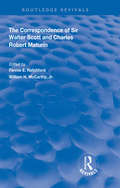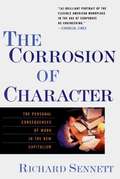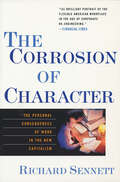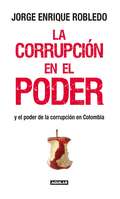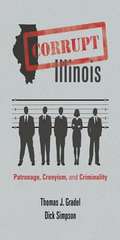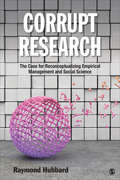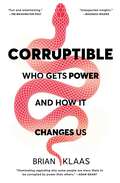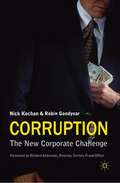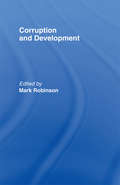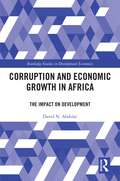- Table View
- List View
The Corporatization of American Health Care: The Rise of Corporate Hegemony and the Loss of Professional Autonomy
by J. Warren Salmon Stephen L. ThompsonIn this book, the authors, as policy analysts, examine the overall context and dynamics of modern medicine, focusing on the changing conditions of medical practice through the lens of corporatization of medicine, physician unionization, physician strikes, and current health policy directions. Conditions affecting the American medical profession have been dramatically altered by the continuing crises of cost increases, quality concerns, and lack of access facing our population, along with the ongoing corporatization toward bottom-line dictates. Pressures on practitioners have been intensifying with much greater scrutiny over their clinical decision-making. Topics explored among the chapters include:History of the Corporatization of American Medicine: The Market Paradigm ReignsPharmaceuticals, Hospitals, Nursing Homes, Drug Store Chains, and Pharmacy Benefit Manager/Insurer IntegrationMedical Practice: From Cottage Industry to Corporate PracticeMedical Malpractice Crisis: Oversight of the Practice of MedicineBig Data: Information Technology as Control over the Profession of MedicinePhysician Employment Status: Collective Bargaining and StrikesThe Corporatization of American Health Care offers different perspectives with the hopes that physicians will unite in a new awareness and common cause to curtail excessive profit-making, renew professional altruism, restore the charitable impulse to health provider institutions, and unite with other professionals to truly raise levels of population health and the quality of health care. It is also a necessary resource for health policy analysts, healthcare administrators, health law attorneys, and other associated health professions.
The Corporatization of the Business School: Minerva Meets the Market
by Dan Kärreman Mats Benner Tony HuzzardWith business schools becoming increasingly market-driven, questionable trends have emerged, such as the conflation of academic and corporate management, and the notion that academics and students are market players, who respond rationally to market signals. Using individual studies from leading scholars in a variety of disciplines and countries, this book identifies the global pressures behind these trends. It focuses on the debates surrounded the commercialization of business schools, and the rise of different methods of measuring their success. In their unique approach, the authors and editors discuss the impact of the confrontation between the timeless values embodied by Minerva, the Roman goddess of Wisdom, and the hard realities of competition and corporatization in modern society. This book will be compelling reading for students and academics in critical management studies, organizational studies, public management and higher education, as well as for stakeholders in academia and educational policy.
Corporatizing Canada: Making Business out of Public Service
by Jamie Brownlee Chris Hurl Kevin WalbyFrom schools to hospitals, from utilities to food banks, over the past thirty years corporatization has transformed the public sector in Canada. Economic elites take control of public institutions and use business metrics to evaluate their performance, transforming public programs into corporate revenue streams. Senior managers use corporate methodology to set priorities in social services and create “market-friendly” public sector cultures. Even social activist organizations increasingly look and act like multinational corporations while non-governmental organizations pursue partnerships with the same corporations they ostensibly oppose. Corporatizing Canada critically examines how corporatization has been implemented in different ways across the Canadian public sector and warns us of the threat that neoliberal corporatization poses to democratic decision-making and the public at large.
Corporatocracy: How to Protect Democracy from Dark Money and Corrupt Politicians
by Ciara Torres-SpelliscyReveals how corporate greed led to scandal, corruption, and the January 6th insurrection—and how we can stop it from happening againDonald Trump’s false claims of election fraud and the violence of the Capitol riot have made it unavoidably clear that the future of American democracy is in peril. Unseen political actors and untraceable dark money influence our elections, while anti-democratic rhetoric threatens a tilt towards authoritarianism.In Corporatocracy, Ciara Torres-Spelliscy reveals the role corporations play in this dire state of political affairs, and explains why and how they should be held accountable by the courts, their shareholders, and citizens themselves. Drawing on key Supreme Court cases, Torres-Spelliscy explores how corporations have, more often than not, been on the wrong side of history by working to undermine democratic norms, practices, and laws. From bankrolling regressive politicians to funding ghost candidates with dark money, she shows us how corporations subvert the will of the American people, and how courts struggle to hold them and corrupt politicians accountable.Corporations have existed far longer than democracies have. If voters, consumers, and investors are not careful, corporations may well outlive democracy. Corporatocracy brings all of these shadowy tactics to light and offers meaningful legal reforms that can strengthen and protect American democracy.
Corporeal Ethics for Feminist Work: (Dis)organized Bodies (Feminist Perspectives on Work and Organization)
by Daniela PianezziWhat does it mean to be a feminist? What can feminism say about ourselves, the work we do, and our ways of living together? This book draws on the work of Fraser, Butler, and Braidotti to examine how societal and organizational processes shape and are shaped by our perception of work, value, and identity. Disrupting the long-established mind–body dualism, the book reveals its impact on our understanding of value, raising critical questions about how different forms of feminism influence work practices and recognition. With a foreword by Luigi Maria Sicca and an afterword by Melissa Tyler, this is a unique and insightful analysis that sparks critical reflection, offering a foundation for corporeal ethics to drive meaningful change in organizations and society.
Corps Business
by David H. FreedmanFast. Motivated. Hard-hitting.That's what every business wants to be. And that's why the U.S. Marines excel in every mission American throws at them, no matter how tough the odds. In Corps Business, journalist David H. Freeman identifies the Marine's simple but devastatingly effective principles for managing people and resources -- and ultimately winning. Freedman discusses such techniques as "the rule of three," "managing by end state," and the "70% solution," to show how they can be applied to business solutions.
Corps Business
by David H. FreedmanFast. Motivated. Hard-hitting. That's what every business wants to be. And that's why the U.S. Marines excel in every mission American throws at them, no matter how tough the odds. In Corps Business, journalist David H. Freeman identifies the Marine's simple but devastatingly effective principles for managing people and resources -- and ultimately winning. Freedman discusses such techniques as "the rule of three," "managing by end state," and the "70% solution," to show how they can be applied to business solutions.
CORRALITO, EL (EBOOK)
by Lucio Di MatteoEl Corralito no fue una catástrofe natural e inevitable, sino el resultado de un esquema económico inviable, un gobierno sin apoyos partidarios y un gabinete de ministros paralizado. Un sistema pensado como respirador artificial de la Convertibilidad, que ya estaba muerta. A diez años de aquella decisión que restringió la libre disposición del dinero que los argentinos tenían en sus cuentas bancarias, este libro cuenta por primera vez cómo se vivieron desde el interior del Gobierno esos días clave, cómo se gestó la última gran estafa al pueblo argentino y cuál fue el verdadero objetivo de ese manotazo de ahogado. Con datos nunca antes revelados, El Corralito repasa el dubitativo comienzo de la gestión delarruista, la discutida llegada de Cavallo al Gobierno, el abandono del FMI, la ruptura de la Alianza, el entorno presidencial y la represión final del 19 y 20 de diciembre.
Corrections Corp. of America
by Edward J. RiedlThis case illustrates a comprehensive valuation of a publicly-traded firm specializing in building and managing prisons. Students must assess the firm's strategy and risks, evaluate key financial reports, derive forecasts of future performance, and use these forecasts to value the firm.
Correlation and Regression: Applications For Industrial Organizational Psychology and Management (Second Edition)
by Philip Bobko"This book provides one of the clearest treatments of correlations and regression of any statistics book I have seen. . . . Bobko has achieved his objective of making the topics of correlation and regression accessible to students. . . . For someone looking for a very clearly written treatment of applied correlation and regression, this book would be an excellent choice. " --Paul E. Spector, University of South Florida "As a quantitative methods instructor, I have reviewed and used many statistical textbooks. This textbook and approach is one of the very best when it comes to user-friendliness, approachability, clarity, and practical utility. " --Steven G. Rogelberg, Bowling Green State University
Correlation and Regression: Applications for Industrial Organizational Psychology and Management
by Philip Bobko"This book provides one of the clearest treatments of correlations and regression of any statistics book I have seen. . . . Bobko has achieved his objective of making the topics of correlation and regression accessible to students. . . . For someone looking for a very clearly written treatment of applied correlation and regression, this book would be an excellent choice." --Paul E. Spector, University of South Florida "As a quantitative methods instructor, I have reviewed and used many statistical textbooks. This textbook and approach is one of the very best when it comes to user-friendliness, approachability, clarity, and practical utility." --Steven G. Rogelberg, Bowling Green State University
Correlation Risk Modeling and Management
by Gunter MeissnerA thorough guide to correlation risk and its growing importance in global financial marketsIdeal for anyone studying for CFA, PRMIA, CAIA, or other certifications, Correlation Risk Modeling and Management is the first rigorous guide to the topic of correlation risk. A relatively overlooked type of risk until it caused major unexpected losses during the financial crisis of 2007 through 2009, correlation risk has become a major focus of the risk management departments in major financial institutions, particularly since Basel III specifically addressed correlation risk with new regulations. This offers a rigorous explanation of the topic, revealing new and updated approaches to modelling and risk managing correlation risk.Offers comprehensive coverage of a topic of increasing importance in the financial worldIncludes the Basel III correlation frameworkFeatures interactive models in Excel/VBA, an accompanying website with further materials, and problems and questions at the end of each chapter
The Correspondence of Sir Walter Scott and Charles Robert Maturim (Routledge Revivals)
by Fannie E. Ratchford William H. McCarthyOriginally published in 1937, The Correspondence of Sir Walter Scott and Charles Robert Maturin contains twenty-two letters presenting a penetrating and vivid self-portrait of Sir Walter Scott. Scott's patronage of Maturin, this impecunious Irish author, giving him wise advice, lending encouragement in his work and at times badly needed financial assistance, extended over a period of twelve years to the time of Maturin's death, and his kind subsequent letters, written to Maturin's family, in the midst of his own great financial troubles, bring to a fitting close this single unit in Scott's rich social life. Since the two men never met, the whole relationship was built up through thier literary work and their letters to each other, displayed in this volume.
The Corrosion of Character: The Personal Consequences of Work in the New Capitalism
by Richard SennettIn The Corrosion of Character, Richard Sennett draws on interviews with dismissed IBM executives, bakers, a bartender turned advertising executive, and many others to call into question the terms of our new economy. Sennett explores the contemporary scene characterized by Enrico's son, Rico, whose life is more materially successful, yet whose work lacks long-term commitments or loyalties.
The Corrosion of Character: The Personal Consequences of Work in the New Capitalism
by Richard SennettA Business Week Best Book of the Year.... "A devastating and wholly necessary book."--Studs Terkel, author of Working In The Corrosion of Character, Richard Sennett, "among the country's most distinguished thinkers . . . has concentrated into 176 pages a profoundly affecting argument" (Business Week) that draws on interviews with dismissed IBM executives, bakers, a bartender turned advertising executive, and many others to call into question the terms of our new economy. In his 1972 classic, The Hidden Injuries of Class (written with Jonathan Cobb), Sennett interviewed a man he called Enrico, a hardworking janitor whose life was structured by a union pay schedule and given meaning by his sacrifices for the future. In this new book-a #1 bestseller in Germany-Sennett explores the contemporary scene characterized by Enrico's son, Rico, whose life is more materially successful, yet whose work lacks long-term commitments or loyalties. Distinguished by Sennett's "combination of broad historical and literary learning and a reporter's willingness to walk into a store or factory [and] strike up a conversation" (New York Times Book Review), this book "challenges the reader to decide whether the flexibility of modern capitalism . . . is merely a fresh form of oppression" (Publishers Weekly, starred review). Praise for The Corrosion of Character: "A benchmark for our time."--Daniel Bell "[A]n incredibly insightful book."--William Julius Wilson "[A] remarkable synthesis of acute empirical observation and serious moral reflection."--Richard Rorty "[Sennett] offers abundant fresh insights . . . illuminated by his concern with people's struggle to give meaning to their lives."--[Memphis] Commercial Appeal
La corrupción en el poder: Y el poder de la corrupción en Colombia
by Jorge Enrique RobledoUn libro llamado a revelar los niveles de corrupción, politiquería y demagogia a los que ha llegado Colombia: Transmilenio, Saludcoop, Isagén, Reficar y las Zidres. (Para ver las transcripciones de los debates del senador Robledo sobre los temas tratados en este libro por favor copie el siguiente link y péguelo en una ventana nueva: http://bit.ly/2h0EOqM ) Con la rigurosidad que lo caracteriza, Jorge Enrique Robledo explica de manera sencilla y directa qué hubo detrás de los grandes desfalcos y escándalos de corrupción en Colombia en los últimos años. Reconocido como uno de los senadores más respetados de Colombia, Robledo presenta un libro revelador que promete levantar ampolla: como resultado de una exhaustiva y valiente investigación revela los detalles más sorprendentes de cómo se han ejecutado proyectos y negocios que involucran las más estratosféricas sumas de dinero con el único objetivo de lucrar a empresarios y entregar beneficios non sanctos a representantes de diferentes gobiernos y a políticos colombianos. Su investigación devela los casos de Transmilenio en Bogotá, Reficar en Cartagena, Saludcoop, Isagén y las Zonas de Interés de Desarrollo Rural, Económico y Social (Zidres) que busca arrebatarle la tierra a los campesinos y mal usar los terrenos baldíos de la Nación para entregárselos a particulares.
Corrupt: William Aramony--Understanding This Type of Bad Leadership
by Barbara KellermanCorrupt leaders can be found everywhere, even in seemingly virtuous places such as charitable organizations. Proof of this is William Aramony, former head of United Way of America. He, along with the followers who enabled him, took money from those who needed it most and stained the reputation of American charities. Here the author tells Aramony's story, providing a hindsight view of what could have prevented this severe breach of trust.
Corrupt Illinois: Patronage, Cronyism, and Criminality
by Thomas J. Gradel Dick SimpsonPublic funds spent on jets and horses. Shoeboxes stuffed with embezzled cash. Ghost payrolls and incarcerated ex-governors. Illinois' culture of "Where's mine?" and the public apathy it engenders has made our state and local politics a disgrace. In Corrupt Illinois, veteran political observers Thomas J. Gradel and Dick Simpson take aim at business-as-usual. Naming names, the authors lead readers through a gallery of rogues and rotten apples to illustrate how generations of chicanery have undermined faith in, and hope for, honest government. From there, they lay out how to implement institutional reforms that provide accountability and eradicate the favoritism, sweetheart deals, and conflicts of interest corroding our civic life. Corrupt Illinois lays out a blueprint to transform our politics from a pay-to-play-driven marketplace into what it should be: an instrument of public good.
Corrupt Research: The Case for Reconceptualizing Empirical Management and Social Science
by Raymond HubbardAddressing the immensely important topic of research credibility, Raymond Hubbard’s groundbreaking work proposes that we must treat such information with a healthy dose of skepticism. This book argues that the dominant model of knowledge procurement subscribed to in these areas—the significant difference paradigm—is philosophically suspect, methodologically impaired, and statistically broken. Hubbard introduces a more accurate, alternative framework—the significant sameness paradigm—for developing scientific knowledge. The majority of the book comprises a head-to-head comparison of the "significant difference" versus "significant sameness" conceptions of science across philosophical, methodological, and statistical perspectives.
Corrupt Research: The Case for Reconceptualizing Empirical Management and Social Science
by Raymond HubbardAddressing the immensely important topic of research credibility, Raymond Hubbard’s groundbreaking work proposes that we must treat such information with a healthy dose of skepticism. This book argues that the dominant model of knowledge procurement subscribed to in these areas—the significant difference paradigm—is philosophically suspect, methodologically impaired, and statistically broken. Hubbard introduces a more accurate, alternative framework—the significant sameness paradigm—for developing scientific knowledge. The majority of the book comprises a head-to-head comparison of the "significant difference" versus "significant sameness" conceptions of science across philosophical, methodological, and statistical perspectives.
Corruptible: Who Gets Power and How It Changes Us
by Brian KlaasAn &“absorbing, provocative, and far-reaching&” (Kirkus Reviews, starred review) look at what power is, who gets it, and what happens when they do, based on over 500 interviews with those who (temporarily, at least) have had the upper hand—from the creator of the Power Corrupts podcast and Washington Post columnist Brian Klaas.Does power corrupt, or are corrupt people drawn to power? Are tyrants made or born? Are entrepreneurs who embezzle and cops who kill the result of poorly designed systems or are they just bad people? If you were suddenly thrust into a position of power, would you be able to resist the temptation to line your pockets or seek revenge against your enemies? To answer these questions, Corruptible draws on over 500 interviews with some of the world&’s top leaders—from the noblest to the dirtiest—including presidents and philanthropists as well as rebels, cultists, and dictators. Some of the fascinating insights include: how facial appearance determines who we pick as leaders, why narcissists make more money, why some people don&’t want power at all and others are drawn to it out of a psychopathic impulse, and why being the &“beta&” (second in command) may actually be the optimal place for health and well-being. Corruptible also features a wealth of counterintuitive examples from history and social science: you&’ll meet the worst bioterrorist in American history, hit the slopes with a ski instructor who once ruled Iraq, and learn why the inability of chimpanzees to play baseball is central to the development of human hierarchies. Based on deep, unprecedented research from around the world, and filled with &“unexpected insights…the most important lesson of Corruptible is that when psychopaths inadvertently reveal their true selves, the institutions that they plague must take action that is swift, brutal, and merciless&” (Business Insider).
Corruption
by Nick Kochan Robin GoodyearConcerns about corruption have advanced rapidly up the list of priorities for companies throughout the world. Today, firms of every size are under particular pressure as the recently passed UK Bribery Act places some onerous obligations on their directors and employees. Now, for the first time, corporate strategy and responsibility have been analysed in the context of the new law, as well as that of previous statutes and the law of other countries. This book provides a clear and comprehensive introduction to the new legal and political landscape and examines future issues in compliance and enforcement. Corruption: The New Corporate Challenge surveys the roots of corruption, outlines worldwide efforts to combat the problem, and explores enforcement and policy choices for businesses faced with a new international environment that is ever more hostile to corruption Numerous case studies and practical compliance tips provide businesses with the knowledge needed to operate in high-risk industrial sectors and geographical regions. The authors have conducted extensive interviews with senior figures in law enforcement, academics and lawyers to explore likely developments in the law, and predict how it might be enforced. This book is essential reading not only for businesses that seek advice on tailoring compliance regimes but also for those wanting a deeper context to the global crackdown by governments and the courts on corruption. This is a subject that no corporation can avoid. The strongest response to the new challenge is for a company to re-evaluate its ethical standards and to impress those standards upon its employees and associates. Failure to do so could be very costly indeed.
Corruption and Development
by Mark RobinsonThe problem of corruption is of central significance for the developmental prospects of poor countries. Corruption undermines development by siphoning off resources for infrastructures and public services and by weakening the legitimacy of the state. The volume will appeal to academics and policy-makers concerned with problems of governance and public management in developing countries, as well as specialists working on corruption and designing anti-corruption strategies.
Corruption and Economic Growth in Africa: The Impact on Development (Routledge Studies in Development Economics)
by David N. AbdulaiCorruption is one of the major challenges impeding Africa’s growth and development efforts and its impact is much more pronounced at this point of the continent’s development trajectory. Corruption has political, economic, and social consequences and this book argues that any efforts to help Africa grow and develop must prioritise the fight against it, so that the aid and funding given for projects in the region can continue to be sustained. The book also tackles the issue of national security and instability caused by corruption. The author argues that progress cannot happen in countries and environments where instability exists and persists. Corruption in Africa has contributed to instability and other national security challenges, especially in fragile states on the continent. The book starts by looking at the three major types of corruption: petty, grand, and systemic and then goes on to address the different categories of corruption such as bureaucratic, legislative, political, as well as public and private sector aspects. It also deals with common forms of corruption as well as some of the causes, such as bad governance and excessive greed, to mention a few. Further, it critically examines how current political systems on the continent contribute to this condition. The book argues that some of the solutions that have been proposed to date are not viable or have not worked in practice, and through applied research, offers workable solutions that policy makers, African politicians, academics, and students of economics and development can use as a reference guide in the fight against corruption.
Corruption and Economic Growth in Africa: The Impact on Development (Routledge Studies in Development Economics)
by David N. AbdulaiCorruption is one of the major challenges impeding Africa’s growth and development efforts and its impact is much more pronounced at this point of the continent’s development trajectory. Corruption has political, economic, and social consequences and this book argues that any efforts to help Africa grow and develop must prioritise the fight against it, so that the aid and funding given for projects in the region can continue to be sustained. The book also tackles the issue of national security and instability caused by corruption. The author argues that progress cannot happen in countries and environments where instability exists and persists. Corruption in Africa has contributed to instability and other national security challenges, especially in fragile states on the continent.The book starts by looking at the three major types of corruption: petty, grand, and systemic and then goes on to address the different categories of corruption such as bureaucratic, legislative, political, as well as public and private sector aspects. It also deals with common forms of corruption as well as some of the causes, such as bad governance and excessive greed, to mention a few. Further, it critically examines how current political systems on the continent contribute to this condition.The book argues that some of the solutions that have been proposed to date are not viable or have not worked in practice, and through applied research, offers workable solutions that policy makers, African politicians, academics, and students of economics and development can use as a reference guide in the fight against corruption.
